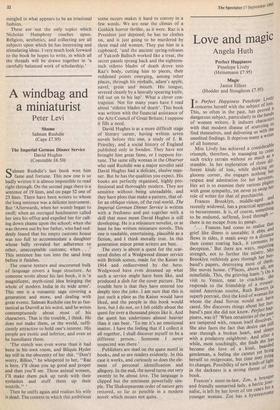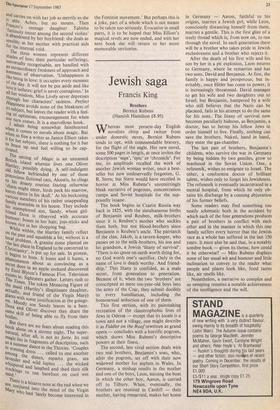Love and magic
Angela Huth
In Perfect Happiness Penelope Lively concerns herself with the subject of loss' This, so often in the past, has proved a dangerous subject, particularly in the hands of women writers. It induces characters with that modern disease of scurrying to find themselves, and delivering us with the oun edithedumfionudrings. It deprives many a writ
f all er
Miss Litvheelyrehfoarse,acihniemveadnaagicnognsiderable
triumph to cross
such tricky terrain without so much as a stumble. In her exploration of three dif- ferent kinds of loss, while shirking no gloomy corner, she engages nothing but respect and admiration for her heroines' Her art is to examine their various plights with great sympathy, yet never to swoP her role of writer for that of psychiatrist. Frances Brooklyn, middle-aged and recently widowed, has a practical aPPr0a,c11 to bereavement. It is, of course, 50metInrk5 to be endured, suffered, lived through — there is no escape from its pangs. `... Frances had come to realise that grief like illness is unstable; it ebbs and then s cionintides, i t steals back it a yi t to ramdeins tt sa_:nbcoye deception.' But there are ways, requtun° strength, not to further the misery. Mrs Brooklyn ruthlessly goes through her hus" sb ha en dm' sovpeaspehros u, sdee. s(t,rpolyaicnegs,maobsotveo fat heirl. ii are minefields. This, the grieving learn.') tin " visit to Venice, near to cracking, she responds to the friendship of a trouser- suited American tourist, Ruth Bowers (a superb portrait, this) the kind of woman for whom the dead Steven would not have cared. She discovers things about her bus- band's past she did not know. Perfect hap- piness, was it? 'When certainties of the Past, are tampered with, reason itself dissolves, She also faces the fact that desire can still sear through a broken heart, and sleeps with a predatory neighbour. And after a while, most touchingly, she finds she has. become the love of a kind, bearded gentleman, a feeling she cannot yet bring herself to reciprocate, but time may bring its changes. Possibility of new kinds of HO in the darkness is a strong theme of the book. Frances's sister-in-law, Zoe, a brusclue and friendly unmarried lady, a hectic jour- nalist, is left by her lover of ten years for a younger woman. Zoe has a hysterectoMY and carries on with her job as merrily as she is able. Aches, but no moans. Then Frances's teenage daughter Tabitha 'furiously intent among the second violins' is abandoned by her boyfriend: she deals as sensibly as her mother with practical aids for the internal void. The three women represent different shades of loss; their particular sufferings, universally recognisable, are handled with an extraordinary freshness of approach and keenness of observation. 'Unhappiness is like being in love: it occupies every moment Of the may. It will not be put aside and like love it isolates: grief is never contagious.' In all her wisdom, Miss Lively never depresses through her characters' sadness. Perfect happiness avoids none of the bleakness of its subject, but leaves the reader with a feel- ing of optimism, encouragement for when our turn comes. It is a marvellous book.
I admit being somewhat fainthearted When it comes to novels about magic. But w. hen so fine a writer as Janice Elliott takes It for her subject, there is nothing for it but to brace up and feel willing to be cap- tivated.
The setting of Magic is an unnamed British island wherein lives one Oliver Hartley, possibly dying. A self-indulgent Old fellow befriended by one of those Precocious fictional cats, Alcestis, he clings to his dreary routine fearing otherwise chaos might enter, birds peck his marrow, leaves dance in his skull.' At his beckoning various members of his rather unappealing fa.lhilY assemble in his house. They include his unemployed son, Sandy, whose girl- fnend
—ora is observed with accurate hburnour: bones in her hair, joss-sticks and rovvn rice in her shopping bag. While within, the Hartley family reflect
lthe Past and squabble a bit; without is a ocal problem. A granite stone planted on Cthe last place in England to be converted to hristianity', is put up for sale. In protest, It begins to hum. it hums and it hums, a Phenomenon about as convincing as a secret door in an apple orchard discovered bY Enid Blyton's Famous Five. Television zoon, ; Sightseers gather. Letters rush to th"e Times. The token Menacing Figure of e m.,F, actually, (Hartley's illegitimate daughter, ally, and friend of the Virgin Mary) glares with some justification at the goings- Moody son Sandy leaves in a bate. _ ura and Oliver discover they share the same skill of being able to fly from their bodies.
But there are no fears about reading this book alone on a stormy night. The super- natural, after all, is not its forte. Its real magic lies in fragments of description, such as a summer dance in the Thirties. 'Couples in evening dress ... called to one another among the dunes, esparto grass, sea lavender and wild lupins . , the wicked swthispered and laughed and shed their silk
ockings
sand.' to run barefoot on cool wet There is a bizarre note at the end when we ak le conjured into the mind of the Virgin wiarY who had 'lately become interested in
the Feminist movement.' But perhaps this is a joke, part of a whole which is not meant to be taken too seriously. Evocative in small parts, it is to be hoped that Miss Elliott's magical revels are now ended, and with her next book she will return to her more memorable territories.







































 Previous page
Previous page